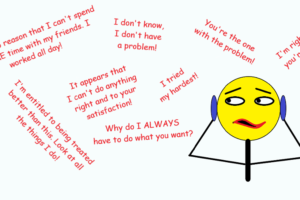Most people don’t really understand anything about domestic abuse. They only know what they have read or seen in the movies. In these venues, domestic abuse is frequently portrayed as someone losing their temper or someone who is triggered by the behavior of someone else.
This is NOT what domestic abuse is about. Domestic abuse is a systematic method of asserting and maintaining power and control over a current or former intimate partner or a situation involving a current or former intimate partner. Read my blog: Know why Domestic Abuse is not an Anger Management Problem
The Question
For 40+ years I have worked in the field of domestic abuse. Starting off, I worked with victims of domestic abuse. For the bulk of my career I worked with batterers, the perpetrators of domestic abuse. Throughout it all I presented at hundreds of conferences from Maine to California about how to identify and work with perpetrators of domestic abuse.
It doesn’t matter the audience, there is one question I was ALWAYS asked at EVERY conference, at EVERY presentation: “Why does she stay?”
Usually this statement was followed by, “If someone abused me, I would be out of there so fast!!!!!!!!!!!”
Maybe.
What if you didn’t know a certain behavior was domestic abuse?
Or what if you didn’t identify certain behavior as domestic abuse? For example, what if your current intimate partner repeatedly criticized you: the way you do things, the way you look, the way you speak, the way you dress, the way you chew your food, the way you parent your child, etc. The list can go on and on. Would you consider that domestic abuse? Because it does not involve physical contact, many don’t consider criticism domestic abuse. But it is. Constant criticism is one part of a systematic method of attaining power and control in an intimate relationship.
Domestic abuse starts in just this manner. Insidiously. Quietly. Stealthily. All equating to the frog in water saying.
An Urban Myth
You may have heard about the urban myth of the frog in water: if you put a frog in a pot of boiling water the frog will instantly leap out. But if you put the frog in a pot filled with pleasantly tepid water and gradually heat it, the frog will remain in the water until it boils to death.
Allegedly, the frog is not able to detect the gradual increase in temperature until it’s too late.
This allegory is frequently used in economics, business and marketing to point out that change has to be introduced gradually if it is to be successful. It illustrates that we tend to accept things that creep up on us slowly but steadily, even when they take control of our lives.
Sometimes you can wake up and find yourselves in boiling water! NIH – National Library of Medicine – National Center of Biotechnology Information: The tale of the boiling frog
The “Joke”
Certainly, victims of domestic abuse do not look forward to be abused. If on a first date an abuser criticized everything about his date or if he physically hit his date, it is unlikely there would be another date.
But rarely do first dates include that overt criticism or physical abuse. On a first date, abusers are on their best behavior.
There is an old very unfunny “joke” that goes something like this, “If you want a good time, date a batterer….. once.” Batterers are always on their best behavior in the beginning of a relationship. They ”schmooze”, are attentive and are light-hearted because they want their date to be impressed.
It isn’t until later in the relationship, when the victim starts to trust and believe in the abuser, that the abuse begins. She may even believe what he says more than she believes herself. She may believe the batterer more than she believes her family and friends. This is when the temperature of the tepid water starts to heat up (the frog in water).
Examples of Being a Frog in Water
It is not just victims of domestic abuse who exhibit frog-in-water behavior. It is not uncommon for all of us to be “frogs” at some point in our life! Sometimes it is by choice, and sometimes it isn’t!
Example One:
By choice. Have you ever been to the beach? If you have, you have probably watched people approach the water. Some people never test the temperature of the water, but run into the water and jump right back out again once they realize how cold the water is!
Then there are the people who will go into the water by first putting their toes in the water. When their toes acclimate to the cold water, they go into the water up to their ankles. When their ankles acclimate to the cold water, they walk out even further each time, waiting until their bodies have adjusted to the cold (the frog in water).
Example Two:
By choice. Driving a car. When you got behind the wheel of a car for the first time, did you know exactly what to do? Did you know exactly how much pressure to put on the accelerator or the brake?
Or did you take it slowly? Did you start off learning how to drive by going forward and backward in the driveway of your home? Or did someone take you to a church parking lot on a Monday evening and let you drive around? Or did you go out with a driving instructor? For most people, feeling comfortable in driving is a slower process (the frog in water).
Example Three:
Not by choice. Think about the 5 year old starting kindergarten. Unless a child is being homeschooled, going to kindergarten is not a choice. It is a totally new experience. Some children will just walk into the classroom and instantly feel at home.
Others start off by Mom or Dad going into the classroom with the child, sometimes even holding hands. Then after a few days, the child just wants the parent to walk them to the classroom. As the child adjusts, the parent can take the child to the front door of the school. Then drop them off outside of the school, and the child goes in by themselves (the frog in water).
Take Away Point
Next time you are tempted to say, “Why does a victim of domestic abuse stay in an abusive relationship?”, think about the times you have slowly experienced a new situation. At what point did you realize you had become acclimated to the cold water, or had confidence in your driving, or had adjusted to a new situation like going to school? Many times it is not an easy answer.
With warmest regards,
To be notified of new posts, please enter your email address and click on the Subscribe button.












